- Home
- Gayle Forman
Just One Day jod-1 Page 27
Just One Day jod-1 Read online
Page 27
“They have it? They have his address?”
“They have an address. Go collect it now. And then find him.” He looks at me again. “No matter what, you must know.”
I walk out of the hospital, past where the cancer patients are taking their chemotherapy treatments in the late afternoon sun. The printout with Willem’s address is clenched in my fist. I haven’t looked at it yet. I tell Wren that I need a moment alone and make my way toward the old hospital walls.
I sit down on a bench alongside the quadrangle of grass, between the old brick buildings. Bees dance between the flower bushes, and children play—there’s so much life in these old hospital walls. I look at the paper in my hand. It could have any address. He could be anywhere in the world. How far am I willing to take this?
I think of Willem, beaten—beaten!—and still trying to find me. I take a deep breath. The smell of fresh-cut grass mingles with pollen and the fumes from trucks idling on the street. I look at the birthmark on my wrist.
I open the paper, not sure where I’m going next, only sure that I’m going.
Thirty-four
AUGUST
Utrecht, Holland
My guidebook has all of two pages on Utrecht, so I expect it to be tiny or ugly or industrial, but it turns out to be a gorgeous, twisting medieval city full of gabled row houses and canals with houseboats, and tiny little alley streets that look like they might house humans or might house dolls. There aren’t many youth hostels, but when I turn up at the only one I can afford, I learn that before it was a hostel, it was a squat. And I get that sense, almost like a radar communicating from some secret part of the world just to me: Yes, this is where you’re meant to be.
The guys at the youth hostel are friendly and helpful and speak perfect English, just like Willem did. One of them even looks like him—that same angular face, those puffy red lips. I actually ask him if he knows Willem; he doesn’t and when I explain that he looks like someone I’m looking for, he laughs and says he and half of Holland. He gives me a map of Utrecht and shows me how to get to the address the hospital gave me, a few kilometers from here, and suggests I rent a bike.
I opt for the bus. The house is out of the center, in an area full of record stores, ethnic restaurants with meat turning on spits, and graffiti. After a couple of wrong turns, I find the street, opposite some railroad tracks, on which sits an abandoned freight car, almost completely graffitied over. Right across the street is a skinny town house, which according to my printout, is the last known address of Willem de Ruiter.
I have to push my way past six bikes locked to the front rail to get to the door, which is painted electric blue. I hesitate before pressing the doorbell, which looks like an eyeball. I feel strangely calm as I press. I hear the ring. Then the heavy clump of feet. I’ve only known Willem for a day, but I recognize that those are not his footsteps. His would be lighter, somehow. A pretty, tall girl with a long brown braid opens the door.
“Hi. Do you speak English?” I ask.
“Yes, of course,” she answers.
“I’m looking for Willem de Ruiter. I’m told he lives here.” I hold up the piece of paper as if in proof.
Somehow I knew he wasn’t here. Maybe because I wasn’t nervous enough. So when her expression doesn’t register, I’m not all that surprised. “I don’t know him. I’m just renting here for the summer,” she says. “I’m sorry.” She starts to close the door.
By now, I’ve learned no or sorry or I can’t help you—these are opening offers. “Is there someone else here who might know him?”
“Saskia,” she calls. From the top of a stairway so narrow it looks like a ladder, a girl appears. She climbs down. She has blond hair and rosy cheeks and blue eyes, and there’s something vaguely farm-fresh about her, as though she just this minute finished riding a horse or plowing a field, even though her hair is cut in spikes and she’s dressed in a woven black sweater that is anything but traditional.
Once again I explain that I’m looking for Willem de Ruiter. Then, even though she doesn’t know me, Saskia invites me in and offers me a cup of coffee or tea.
The three of us sit down at a messy wooden table, piled high with stacks of magazines and envelopes. There are clothes strewn everywhere. It’s clear a lot of people live here. But apparently not Willem.
“He never really lived here,” Saskia explains after she serves me tea and chocolates.
“But you know him?” I ask.
“I’ve met him a few times. I was friends with Lien, who was the girlfriend of one of Robert-Jan’s friends. But I don’t really know Willem. Like Anamiek, I just moved in over the summer.”
“Do you know why he would use this as his address?”
“Probably because of Robert-Jan,” Saskia says.
“Who’s Robert-Jan?”
“He goes to the University of Utrecht, same as me. He used to live here,” Saskia explains. “But he moved out. I took over his room.”
“Of course you did,” I mutter to myself.
“In student houses, people come and go. But Robert-Jan will be back to Utrecht. Not here but to a new flat. Unfortunately, I don’t know where that will be. I just took over his room.” She shrugs as if to say, that’s all.
I drum my fingers on the old wooden table. I look at the pile of mail. “Do you think maybe I could look through the mail? See if there’s anything with a clue?”
“Go ahead,” Saskia says.
I go through the piles. They are mostly bills and magazines and catalogs, addressed to various people who live or have lived at this address. I count at least a half dozen names, including Robert-Jan. But Willem doesn’t have a single piece of mail.
“Did Willem ever get mail here?”
“There used to be some,” Saskia replies. “But someone organized the mail a few days ago, so maybe they threw his away. Like I said, he hasn’t been around in months.”
“Wait,” Anamiek says. “I think I saw some new mail with his name on it. It’s still in the box by the door.”
She returns with an envelope. This one isn’t junk mail. It’s a letter, with the address handwritten. The stamps are Dutch. I want to find him, but not enough to open his personal correspondence. I put the envelope down on the piles, but then I double-take. Because the return address in the upper left-hand corner, written in a swirling unfamiliar script, is mine.
I take the envelope and hold it up to the lamp. There’s another envelope inside. I open the outer envelope and out of that spills my letter, the one I sent to Guerrilla Will in En-gland, looking for Willem. From the looks of the stamps and crossed-out addresses and tape on the envelope, it’s been forwarded a few times. I open up the original letter to see if anyone has added anything to it, but they haven’t. It’s just been read and passed on.
Still, I feel overjoyed somehow. All this time, my scrappy little letter has been trying to find him too. I want to kiss it for its tenacity.
I show the letter to Saskia and Anamiek. They read it and look at me confused. “I wrote this letter,” I say. “Five months ago. When I first tried to find him. I sent it to an address in England, and somehow it found its way here. Same as me.” As I say it, I get that sense again. I’m on the right path. My letter and I landed in the same place, even if it’s the wrong place.
Saskia and Anamiek look at each other.
“We will make some calls,” Saskia says. “We can certainly help you find Robert-Jan.”
The girls disappear up the stairs. I hear a computer chime on. I hear the sounds of one-sided conversations, Saskia on the phone. About twenty minutes later, they come back down. “It’s August, so almost everyone is away, but I am sure I can get you contact information for Robert-Jan in a day or two.”
“Thank you,” I say.
Her eyes flicker up. I don’t like the way they look at me. “Though I might have found a faster way to find Willem.”
“Really? What?”
She hesitates. “His girlfriend.”
> Thirty-five
Ana Lucia Aureliano. That’s her name. Willem’s girlfriend. She goes to some honors college connected to the University of Utrecht.
In all the time I’ve been looking, I never dreamed of getting this far. So I didn’t let myself imagine actually finding him. And while I have imagined him having lots of girls, I hadn’t thought of him having just one. Which, in retrospect, seems awfully stupid.
It’s not like I’m here to get back together. It’s not like there’s a together to get back to. But if I came this close, only to leave, I think I’d regret it for the rest of my life.
Ironically, it’s Céline’s words that finally convince me to go find the girlfriend: You will need to be brave.
University College’s campus is small and self-contained, unlike the University of Utrecht, which sprawls through the city center, Saskia explained. It’s on the outskirts of town, and as I ride out there on a pink bike that Saskia insisted I borrow, I practice what I’m going to say if I find her. Or find him.
The school has very few students, and they all live on campus, and it’s also an international school, drawing students from all over the world, with all the classes taught in English. Which means it only takes asking two people about Ana Lucia before I’m given directions to her dorm.
A dorm that seems less like a college residence than an IKEA showroom. I peer inside the sliding-glass door; it’s all sleek wood and modern furniture, a million miles away from the industrial blah of the room I shared with Kali. The lights are out, and when I knock, no one answers. There’s a little cement landing outside the door that has some embroidered cushions, so I sit down and wait.
I must have dozed off because I wake up falling backward. Someone has opened the door behind me. I look up. The girl—Ana Lucia, I assume—is beautiful, with long wavy brown hair and rosebud lips, accentuated with red lipstick. Between her and Céline, I should feel flattered to be in such company, but that’s not what I’m feeling at the moment.
“Can I help you?” she asks, hovering over me, eyeing me as you might eye a vagrant you caught sleeping on your stoop.
The sun has come out from behind the clouds and it reflects off the glass window, creating a glare. I shield my eyes with my hands and heave myself up. “I’m sorry. I must’ve fallen asleep. I’m looking for Ana Lucia Aureliano.”
“I’m Ana Lucia,” she says, emphasizing the correct pronunciation with the strength of her Spanish lisp: Ana Lu-thee-uh. She squints her eyes, studying me. “Have we met before?”
“Oh, no. I’m Allyson Healey. I’m . . . I’m sorry. This is weird. I’m from America, and I’m trying to find someone.”
“Is this your first term here? There is an online student directory.”
“What? Oh, no. I don’t go here. I go to school in Boston.”
“Who do you search for?”
I almost don’t want to say his name. I could make up a name and then she’d be none the wiser. I wouldn’t have to hear her ask in that adorable accent of hers why I want to know where her boyfriend is. But then I would go home, and I’d have come this far and would never know. So I say it.
“Willem de Ruiter.”
She looks at me for a long moment and then her pretty face puckers, her cosmetic-ad lips part. And then out of those perfect lips comes a spew of what I assume is invective. I can’t be sure. It’s in Spanish. But she’s waving her arms and talking a mile a minute, and her face has gone red. Vate! Déjame, puta! And then she picks me up by my shoulders and throws me off the stoop, like a bouncer ejecting a drunk. She throws my backpack after me, so that everything spills out. Then she slams the door shut, as much as you can slam a sliding-glass door. Locks it. And draws the shades.
I sit there agape for a moment. Then, in a daze, I start putting my things back in my bag. I examine my elbow, which has a scrape from where I landed, and my arm, which bears the half-moons of her nail marks.
“Are you okay?” I look up and see a pretty girl with dreadlocks who has bent down beside me and is handing me my sunglasses.
I nod.
“You don’t need ice or anything? I have some in my room.” She starts to walk back to her stoop.
I touch my head. There’s a bump there too, but nothing serious. “I think I’m okay. Thanks.”
She looks at me and shakes her head. “You were not, by any chance, asking about Willem?”
“You know him?” I ask. “You know Willem?” I come over to her stoop. There’s a laptop and a textbook sitting there. It’s a physics book. She has it open to the section on quantum entanglement.
“I’ve seen him around. This is only my second year, so I didn’t know him when he went here. But only one person makes Ana Lucia crazy like that.”
“Wait. Here? He went to college? Here?” I try to reconcile the Willem I met, the itinerant traveling actor, with an honors college student, and it hits me again how little I know this person.
“For one year. Before I got here. He studied economics, I think.”
“So what happened?” I meant with the college, but she starts telling me about Ana Lucia. About how she and Willem got back together last year but then how she found out that he’d been cheating on her with some French girl the whole time. She’s very casual about it, like none of it is all that surprising.
But my head is reeling. Willem went here. He studied economics. So it takes a minute to finally digest the last part. The cheating-on-Ana-Lucia-with-a-French-girl part.
“A French girl?” I repeat.
“Yes. Apparently, Willem was going to meet her for some secret tryst, in Spain, I think. Ana Lucia saw him shopping for flights on her computer, and thought he was planning to take her as a surprise because she has relatives there. So she canceled her vacation to Switzerland, and then told her family all about it, and they planned a big party, only to discover that the tickets were never for her. They were for the French girl. She freaked out, confronted him right in the middle of the campus—it was quite a scene. He hasn’t been around since, obviously. Are you sure you don’t need some ice for your head?”
I sink onto the stoop next to her. Céline? But she claimed she hadn’t seen him since last year. But then she’d said a lot of things. Including that we were both just ports that Willem visited. Maybe there were a bunch of us out there. A French girl. Or two or three. A Spaniard. An American. A whole United Nations of girls waving from their ports. I think of Céline’s parting words to me, and now they seem ominous.
I always knew that Willem was a player and that I was one of many. But now I also know that he didn’t ditch me that day. He wrote me a note. He tried, however halfheartedly, to find me.
I think of what my mom said. About being grateful for what you have instead of yearning for what you think you want. Standing here, on the campus where he once walked, I think I finally get what she was talking about. I think I finally understand what it truly means to quit while you’re ahead.
Thirty-six
Amsterdam
Forward momentum. That’s my new motto. No regrets. And no going back.
I cancel the Paris-London portion of my flight home so I can fly home straight from London. I don’t want to go back to Paris. I want to go somewhere else. I have five more days in Europe, and there are all these low-cost airlines. I could go to Ireland. Or Romania. I could take a train to Nice and hook up with the Oz crew. I could go anywhere.
But to get to any of those places, I have to go to Amsterdam. So that’s where I’m going first. On the pink bike.
When I went to deliver the bike to Saskia, along with a box of chocolates to say thank you, I told her that I didn’t need her to find me Robert-Jan’s contact information.
“You found what you needed?” she asked.
“Yes and no.”
She seemed to understand. She took the chocolates but told me to keep the bike. It didn’t belong to anyone, and I’d need it in Amsterdam, and I could take it with me on the train or pass it along to someone else.
“The pink White Bicycle,” I said.
She smiled. “You know about the White Bicycle?”
I nodded.
“I wish it still existed.”
I thought about my travels, about all the things that people had passed on to me: friendship, help, ideas, encouragement, macarons. “I think it still does,” I told her.
Anamiek has written me instructions on biking from Utrecht to Amsterdam. It’s only twenty-five miles, and there are bike paths the whole, flat way. Once I get to the eastern end of the city, I’ll hook up with the tram line nine, and I can just follow that all the way to Centraal Station, which is where most of the budget youth hostels are.
Once out of Utrecht, the landscape turns industrial and then to farms. Cows lolling in green fields, big stone windmills—I even catch a farmer in clogs. But it doesn’t take long for the bucolic to meld with office parks and then I’m on the outskirts of Amsterdam, going past a huge stadium that says Ajax and then the bike path dumps me onto the street and things get a little confusing. I hear the bring-bring of a tram, and it’s the number nine, just as Anamiek promised. I follow it up the long stretches past the Oosterpark and what I assume is the zoo—a flock of pink flamingos in the middle of the city—but then things get a little confusing at an intersection by a big flea market and I lose the tram. Behind me, motos are beeping, and the traffic of bicycles seems twice that of cars, and I keep trying to find the tram, but the canals all seem to go in circles, each one looking like the last, with tall stone banks and every kind of boat—from houseboat to rowboat to glass-domed tour boat—on its brackish waters. I pass by improbably skinny gabled row houses and cozy little cafés, doors flung open to reveal walls a hundred years’ worth of brown. I turn right and wind up at a flower market, the colorful blooms popping in the gray morning.

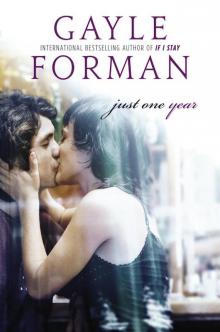 Just One Year
Just One Year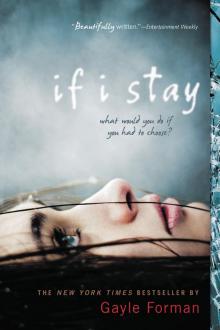 If I Stay
If I Stay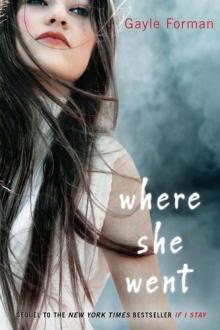 Where She Went
Where She Went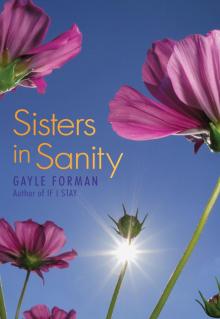 Sisters in Sanity
Sisters in Sanity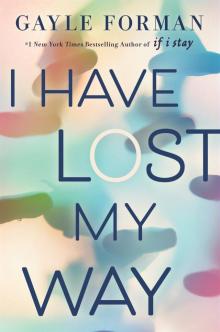 I Have Lost My Way
I Have Lost My Way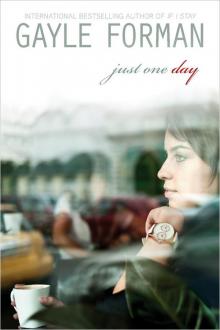 Just One Day
Just One Day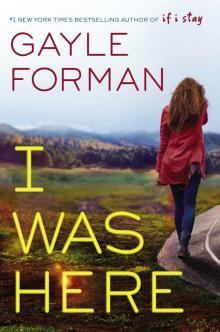 I Was Here
I Was Here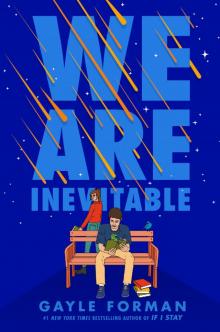 We Are Inevitable
We Are Inevitable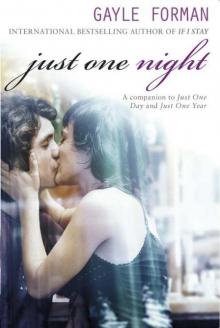 Just One Night
Just One Night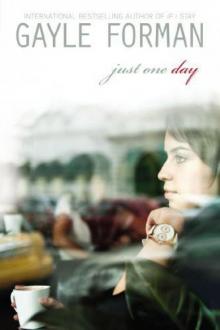 Just One Day jod-1
Just One Day jod-1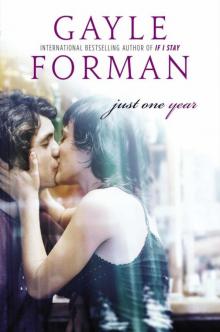 Just One Day 02: Just One Year
Just One Day 02: Just One Year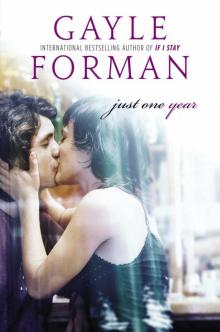 Just One Year jod-2
Just One Year jod-2